
答案和解析来啦:
Most of what we call “politics” really revolves around the question of what you need to do to make a country richer.
所谓“政治”大部分都围绕着一个问题,即采取什么措施才能让国家更富裕。
Rather than ask this of any specific country, let’s imagine designing a country from scratch.
与其讨论任何一个具体国家的政治,不如从零开始,我们一起虚构一个国家。
How could you make it as rich as possible?
怎样才能让它尽可能的富有呢?
Suppose the brief was to design “Richland”: an ideal wealth-creating society.
假设这个虚构的国家叫做“里奇兰”:一个创造财富的理想社会。
What would be the chief characteristics you need to build into this society?
你要为这个社会打造的最主要的特征是什么呢?
What would a nation look like that was ideally suited to success in modern capitalism?
与现代资本主义的成功完美契合的国家是什么样的呢?
Traditional economics guides to eight core requirements for Richland:
传统经济学为里奇兰提供了八个核心要求:
military security and law in order,
军事安全保障和有序的法律、
lack of corruption in institutions,
廉洁的政府、
low amounts of red tape around employment, legislation and taxation,
简洁的就业、立法和税收等行政程序、
a technically well-educated, mobile, flexible labour-force,
技术上受过良好教育、流动灵活的劳动力、
a high-grade infrastructure and good telecommunications,
优质的基础设施、良好的电讯通讯、
fair, transparent, and competitive markets,
公平、透明且具有竞争力的市场、
reliably enforceable contracts,
具有效力的合同、
and low corporation tax (probably between ten and fifteen percent).
较低的企业税率(约10%至15%)。
But aside from these eight factors, there is one thing that invariably makes a critical difference to the wealth of societies: what we might call ‘cultural factors’.
除了以上八个因素,还有一个因素会对社会财富有着至关重要的影响:我们称之为“文化因素”。
解析在这里哦!
1. from scratch,表示“从零开始”,比如:Building a home from scratch can be both exciting and challenging. (白手起家既激动人心又具有挑战性。)
2. capitalism,名词,“资本主义”,比如:the two fundamentally opposed social systems, capitalism and socialism(两种根本对立的社会制度,资本主义与社会主义)。
3. corruption,名词,表示“腐败”,比如:The president faces 54 charges of corruption and tax evasion. (总统面临着54项腐败和逃税的指控。)
4. infrastructure,名词,表示“基础设施”,比如:improvements in the country’s infrastructure(国家基础设施的改善)。
5. enforceable,形容词,表示“(法律或协议)可实施的”,比如:the creation of legally enforceable contracts(签订具有法律效力的合同)。


